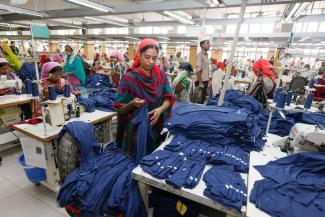Blog
Von Redecker’s “revolution promoting life” is a distraction

Von Redecker’s writing is elegant. It is also easy to read, which is remarkable given that she is a philosopher who bases her work on critical theory. While I appreciate some of the points she makes, I find many of her premises mistaken.
She uses the awfulness of the meatpacking industry as a metaphor. Not only are animals butchered brutally, but as the global public learned during the Covid-19 pandemic, the people working in this industry even in prosperous nations are all too often exploited brutally. According to the philosopher, global heating and its devastating impacts equally result from capitalism. Profits, in this perspective, are generated for the few, while death and unspontaneous, lifeless living remain for the masses.
The core problem, according to her, is the modern notion of property. She argues that owners are free to do whatever they like with the property, even destroy it. The only incentive, according to her, is to attract as much profit as possible from one’s property, without regard for unintended side effects or even obviously devastating impacts on others. In the age of slavery, even people were treated as mere commodities, and patriarchy has reduced women to the exploitable property of men. The end result, the philosopher argues, is the extinction of many species and ultimately humankind itself.
I think a much more nuanced assessment is needed. It matters, for instance, that many jobs in advanced industries are much better than those in the meatpacking industry. Unionised, well-regulated industries coincide with social protection and occupational safety regulations. Germany has just passed new legislation to improve the situation in the meatpacking industry, moreover.
There are different varieties of capitalism. Scandinavian welfare states are different from the more shareholder-driven USA. The kind of state-guided capitalism that has made China the world’s leading exporter is very different from India’s increasingly deregulated economy which has failed to deliver the kind of prosperity the Chinese take for granted today (see Praveen Jha in Focus section of D+C/E+Z e-Paper 2020/09). As for gender and race relations, von Redecker tends to disregard all progress made over the past 200 years as more or less irrelevant. Again, more nuance is needed.
Demographic trends
What von Redecker does not delve into, is that our planet has never had such a large human population as it has today, and that life expectancies around the world have been increasing dramatically in recent decades (see Focus section on Demographic trends in D+C/E+Z e-paper 2020/04). Moreover, while the share of people who do not get enough food is unacceptable at roughly 10 %, that share is lower than it has been in ages. Desperate need and misery marked human life at the beginning of the Industrial Revolution, when less than 1billion people populated our planet. Now we are more than 7 billion.
Another healthy demographic trend is that women today on average have far fewer children than only decades ago. The reasons are that women are better educated, their access to contraceptives has improved and they are generally taking more control of their lives. Data of this kind do not confirm von Redecker’s diagnosis of a death cult, but they do coincide with the global triumph of capitalism.
Gender-based violence
Von Redecker bemoans the tough fate of women labouring in the sweatshops of emerging markets, but she shies away from discussing the fact that traditional rural lifestyles cannot feed village populations that are now much larger than they were two or three generations ago. Nonetheless, she does admit in passing that many of the women concerned have not only escaped even worse rural poverty, but actually gained some personal autonomy by earning their own money, for example in garment production. Evidently, capitalism as such has not reduced women to being merely men’s property, but instead of pondering the implications, the author merely goes on to argue that the price women pay for their new-found and, indeed, limited liberties is gender-based violence.
The murder and rape of women, according to von Redecker, results from men trying to enforce property rights they are now being denied. It is true, of course, that femicide is unacceptable. It is equally true, that outdated gender roles contribute to murderous violence. But it is odd to blame capitalism when gender-based violence occurs outside the workplace and is perpetrated by men the women are intimately related to. Is it not the other way around? With factory work leading to the woman’s modest personal autonomy which a male partner finds impossible to accept? And what about the repression women face in traditional village settings? Von Redecker uses the example of Mexican Maquildaroras, with which I am not familiar. I have a better understanding of South Asia, where the scenario is similar, and women’s traditional lives are definitely not repression-free.
I’ll close for now. In another blog post soon, I plan to discuss how von Redecker’s book fails to take account of the economic theory of public goods and how she over-estimates the role of social movements.
Reference
Von Redecker, E., 2020: Revolution für das Leben (“Revolution promoting life”, in German). Frankfurt, S. Fischer Verlag.












